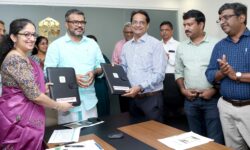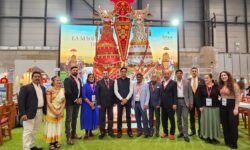
THIRUVANANTHAPURAM:
As the ultimate aim of science is to bring about a qualitative change in society, it is important for the scientific community to acquire communication skills to explain to common people how their work has contributed to their wellbeing and the progress of the country, according to Dr A.Ajayaghosh, former director of CSIR-National Institute for Interdisciplinary Science and Technology (NIIST), Thiruvananthapuram.
Delivering the National Science Day lecture at Rajiv Gandhi Centre for Biotechnology (RGCB) here, Dr Ajayaghosh said creation of public awareness about science and its achievements is as important as making progress in science and technology.
“We scientists should learn how to talk to people on what science has done to make their lives better in a way they understood”, he said, while talking on “Science and Society.”
Addressing students from various school and colleges present in good numbers on the occasion, he emphasised that the youth who make science as their preferred domain can contribute significantly in telling the people of the progress of the science and how it impacted their lives.
India has made remarkable progress in science over the last 75 years after attaining independence due to the government support and collective efforts of the scientific institutions, he said touching on ‘India’s contribution to global science and welfare’.
Making an overview of the evolution of science in India since the ancient times, and through the pre-independence era and the post-independence decades, he said there was no reason to regret for Indians when it comes to scientific progress though there are some areas where the country has not done on a par with some of the advanced countries.
The way India managed the Covid-19 pandemic demonstrated the country’s scientific prowess before the whole world. The vaccine developed in the country saved thousands of lives, not only in India but also in many other countries, said Dr Ajayaghosh, a recipient of top honours including the SS Bhatnagar Award.
Dr Ajayaghosh said science had developed in ancient India in consonance with the civilisational ideal of universal wellbeing. India made significant contributions to astronomy, calculated the value of pi, established the importance of zero and lasting contributions to medicine, to mention a few, he said.
In the pre-independence period scientists like J C Bose and C V Raman made path-breaking discoveries, while Srinivasa Ramanujan made outstanding contributions to mathematics. “These are just some of the few names that immediately come to every one’s mind. The list is long”, he said.
On attaining independence, India’s first prime minister Jawaharlal Nehru asserted the critical role of science and technology in the nation’s progress. Though in the initial years resource crunch was grim that was not allowed to come in the way and now the country could be proud of having top class scientific institutions, he said, adding that outstanding progress has been made in the last 10 to 15 years.
“This progress has been happening collectively in many domains. People are enjoying the benefits of scientific and technological research and development. And, science is going to play a critical role in achieving India’s goal of becoming a global super power by leveraging the intellectual ecosystem of Indian science”, he said, adding the idea of AtmaNirbhar Bharat has been conceived in this spirit.
A huge change is in the making now, touching vital areas that need greater attention like advanced research in engineering and medicine, developing manufacturing technologies, reducing external dependence on machinery and automation, increased focus on industries and agriculture and creation of an innovation ecosystem, he said.
Welcoming the Chief Guest and the gathering, Prof Chandrabhas Narayana, Director RGCB, said it was doubtful whether the youth of the country were made sufficiently aware of the great contributions made by scientists like J C Bose and C V Raman, whose birth anniversary is celebrated as the National Science Day.
“Science contributes significantly to the wellbeing of the society. Proper awareness should be created about the critical role of science in the progress of the society and about the hard and dedicated works of scientists”, Prof Narayana said.




